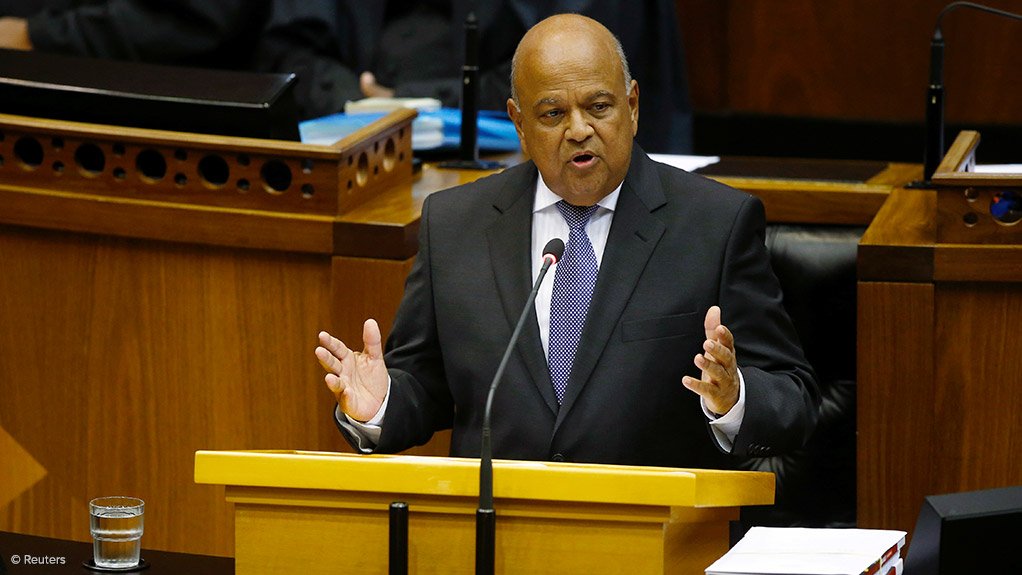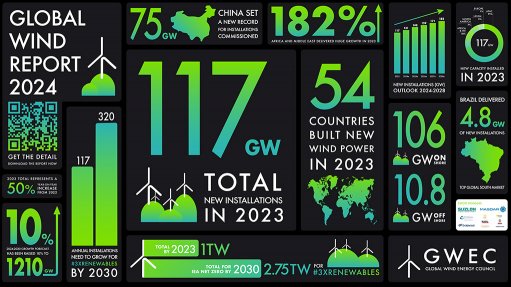Gordhan’s ‘measured consolidation’ strategy seeks to nurture growth green shoots
Finance Minister Pravin Gordhan unveiled what he described as a “measured consolidation” strategy in his Medium-Term Budget Policy Statement (MTBPS) address to lawmakers on Wednesday, in which he confirmed some fiscal slippage and weaker growth and revenue projections.
The plan is premised on a combination of tax increases to raise an additional R43-billion over the coming two years and a further R26-billion reduction in the expenditure ceiling. No details were provided in the MTBPS on the nature of the tax increases, with announcements on the specifics reserved for the actual Budget, which will take place in February.
However, a revised budget deficit of 3.4% of gross domestic product (GDP) was confirmed for 2016/17, which represented a negative balance of R150.5-billion for the period. The revision also represented a slippage from the 3.2% deficit forecast in Gordhan’s February Budget and was accompanied by higher deficit forecasts for the three outer years covered by the statement.
The deficit for 2017/18 is now projected to come in at 3.1%, instead of the 2.8% forecast in February, while the 2018/19 deficit is expected to be 2.7%, rather than 2.4%. The National Treasury expects the figure to “stablise” at 2.5% in 2019/20.
The slippage in the deficit, along with the country’s weak growth outlook, is a major area of focus for the rating agencies, which will be making a call on whether or not to downgrade the country’s sovereign credit rating in December.
South Africa narrowly escaped a downgrade in June, but Fitch Ratings and S&P Global Ratings have the country only one notch above subinvestment grade. Together with Moody’s, the agencies have indicated that they want to see evidence not only of government holding the fiscal-consolidation line, but also that the country has a credible plan for returning to higher levels of growth.
HOSTILE CLIMATE
They would also be watching for signs of any contamination of the Budget and the economy as a result of recent political developments, particularly those surrounding Gordhan, who has emerged as the champion of efforts to ensure that certain elites do not “capture” the National Treasury.
The MTBPS address was delivered against a backdrop of growing tension within the governing party over a recent decision by the Director of National Prosecutions, Shaun Abrahams, to press ahead with fraud charges against Gordhan, relating to a R1.1-million early-retirement pension payment made in 2010 to former South African Revenue Service (Sars) official Ivan Pillay. Gordhan is due to appear in court on November 2, along with Pillay and former Sars commissioner Oupa Magashula.
Since confirmation of the summons on October 11, there has been strong support for the Finance Minister across civil society, with 81 CEOs from leading South African companies putting their names to a document opposing the decision to prosecute Gordhan “on charges that are, according to the preponderance of expert legal opinion, without factual or legal foundation”.
In addition, Freedom Under Law and the Helen Suzman Foundation are legally challenging the decision to prosecute, while a campaign known as Save South Africa is planning a ‘People’s Assembly Against State Capture’ to coincide with the Minister’s court appearance in early November.
The case has also brought to the surface rifts in the African National Congress, with several Cabinet Ministers, including Deputy President Cyril Ramaphosa, expressing support for Gordhan. However, others – notably the ANC Youth League and the Umkhonto we Sizwe Military Veterans Association – have used the fraud charges to put pressure on Gordhan.
The resurgence in protest action by tertiary students under the Fees Must Fall banner added a separate, but equally testing, backdrop to a MTBPS that would otherwise have been tailored primarily towards offering assurances to the rating agencies that South Africa has the fiscal disciple and economic resilience to deserve the benefit of the doubt with regards the threat of a downgrade to junk in December.
Gordhan did not make specific reference to the tumultuous political circumstances in which he found himself, but his deputy, Mcebisi Jonas, said that an improved political climate was one of the ingredients needed for improving the growth outlook.
“Bad politics have an impact on the economy and growth. It is very clear that any sign of political noise is likely to have an impact on growth,” Jonas said.
WEAK GROWTH
On the growth front, however, Gordhan was unable to offer much cheer, with the National Treasury confirming another downward revision to its 2016 growth forecast to 0.5%, from 0.9% in February.
The revision is marginally above the 0.4% projection of the South African Reserve Bank, which recently revised it outlook from an earlier forecast of 0%. However, the International Monetary Fund recently reduced its 2016 growth forecast for South Africa to just 0.1% and also expects sub-1% growth in 2017.
For 2017, the National Treasury is expecting a recovery in GDP growth to 1.3%, followed by 2% in 2018.
TRAP AVOIDANCE
Gordhan argued that the measured approach to fiscal consolidation was being pursued in order to avoid a “low-growth trap”, whereby weak GDP growth produces less tax revenue. In such a scenario the implementation of “aggressive” fiscal consolidation could bolster confidence, but undermine the economy, while taking no action could result in ratings downgrades, capital flight, rapid exchange rate depreciation and a spike in interest rates.
“To avoid this trap, government proposes a balanced consolidation,” Gordhan asserts.
The MTBPS proposes tax hikes of R13-billion in 2017/18, which, together with the tax increases announced in the February Budget, brings the total increase next year to R28-billion. Government will also propose measures to raise additional revenue of R15-billion in 2018/19.
The hikes come amid warnings of lower “tax buoyancy”, which together with lower growth, has reduced the in-year tax estimate by R23-billion. The National Treasury also cautions that, without policy adjustments, gross tax revenue is projected to fall short of February estimates by R36-billion in 2017/18 and R52-billion in 2018/19. Tax buoyancy refers to the relationship between tax collection and economic growth, which in the last two years has been strong with tax growing by 1.2% for every 1% rise in nominal GDP.
On the expenditure front, Gordhan announced a proposal to reduce the spending ceiling by R10-billion in 2017/18 and R16-billion in 2018/19, despite allocating an additional R17.6-billion to post-school education and training in the 2017 Budget.
Non-interest expenditure will grow by a yearly average of 1.2% in real terms over the three-year period, from R1.25-trillion in 2017/18 to R1.45-trillion in 2019/20.
The MTBPS shows that, to fund critical requirements and stay within the reduced expenditure ceiling, government will have to make available R16.7-billion in 2017/18 and R23.2-billion in 2018/19 from existing budgets. However, a drawdown on the contingency reserve will also contribute to these requirements, while a number of provisional allocations made in the previous budget will be rescinded.
Gordhan insisted that the “difficult decisions” were being made to ensure sustainable public finances, including to stabilise debt at just less than 48% of GDP. Government debt currently exceeded R2-trillion, and rising debt-service
costs are said to be crowding out expenditure on priorities like infrastructure and education.
The Minister stressed, though, that there was still an opportunity for a new growth cycle, with “green shoots” reflected in new investment plans.
NURTURING GREEN SHOOTS
However, to nurture those green shoots, government and civil society would need to “work like hell to build consensus and a common purpose, to get the noise out the system, to build the political stability that everybody requires [and] to create the certainty and the confidence in the economy we are building”.
In the only hint to the approach he was adopting amid the current political turmoil surrounding him, Gordhan said: “We have got to make sure that those forces in our society who want inclusive growth so that no-one is left behind are the leaders of this process.”
He warned that it was unlikely to be a smooth road, however, as “vested interests in any process of change will want to defend themselves and their interests”.
He also urged greater unity of purpose, using a Pedi proverb to warn that "lions that fail to work as a team will struggle to bring down even a limping buffalo".
Comments
Press Office
Announcements
What's On
Subscribe to improve your user experience...
Option 1 (equivalent of R125 a month):
Receive a weekly copy of Creamer Media's Engineering News & Mining Weekly magazine
(print copy for those in South Africa and e-magazine for those outside of South Africa)
Receive daily email newsletters
Access to full search results
Access archive of magazine back copies
Access to Projects in Progress
Access to ONE Research Report of your choice in PDF format
Option 2 (equivalent of R375 a month):
All benefits from Option 1
PLUS
Access to Creamer Media's Research Channel Africa for ALL Research Reports, in PDF format, on various industrial and mining sectors
including Electricity; Water; Energy Transition; Hydrogen; Roads, Rail and Ports; Coal; Gold; Platinum; Battery Metals; etc.
Already a subscriber?
Forgotten your password?
Receive weekly copy of Creamer Media's Engineering News & Mining Weekly magazine (print copy for those in South Africa and e-magazine for those outside of South Africa)
➕
Recieve daily email newsletters
➕
Access to full search results
➕
Access archive of magazine back copies
➕
Access to Projects in Progress
➕
Access to ONE Research Report of your choice in PDF format
RESEARCH CHANNEL AFRICA
R4500 (equivalent of R375 a month)
SUBSCRIBEAll benefits from Option 1
➕
Access to Creamer Media's Research Channel Africa for ALL Research Reports on various industrial and mining sectors, in PDF format, including on:
Electricity
➕
Water
➕
Energy Transition
➕
Hydrogen
➕
Roads, Rail and Ports
➕
Coal
➕
Gold
➕
Platinum
➕
Battery Metals
➕
etc.
Receive all benefits from Option 1 or Option 2 delivered to numerous people at your company
➕
Multiple User names and Passwords for simultaneous log-ins
➕
Intranet integration access to all in your organisation




















